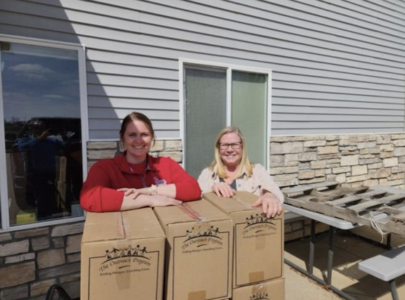St. Francis Catholic holds town hall on ESAs

T-R PHOTO BY NICK BAUR Vice Chairperson of the St. Francis Catholic School Board Jarret Heil walks parents through the nuances and requirements for educational savings accounts (ESAs), which are a part of Gov. Kim Reynolds’ Students First Act, during a town hall meeting on Thursday evening.
Private schools in Iowa are headed into uncharted waters this coming school year following the passage of the Students First Act, and on Thursday, the St. Francis Catholic School in Marshalltown held a public town hall to help provide guidance to parents navigating the new, unprecedented change in the Iowa educational landscape.
The Students First Act, championed and signed into law by Gov. Kim Reynolds in January, makes state funding available and establishes a framework for Education Savings Accounts (ESAs), which may be used by eligible families to cover tuition, fees, and other qualified education expenses at accredited private schools in Iowa.
The plan will phase in over the next three years, eventually allowing all Iowa families to access up to $7,600 in taxpayer funds per student each year for an expected cost of $345 million to the state annually once fully implemented.
For the 2023-2024 school year, families of students entering into kindergarten and students currently enrolled in public schools who wish to enroll in a private school will be eligible to access the ESAs. Families of students already enrolled in private school with a household income of 300% of the 2023 Federal Poverty Guidelines will be eligible to access the accounts.
By the 2024-2025 school year, the requirements to access ESAs will be largely the same, but students who are enrolled in a private school will be eligible if their household income is 400% of the 2024 Federal Poverty Guidelines, and by the 2025-2026 school year, all K-12 students in Iowa will be eligible for ESAs regardless of income.
While the hotly contested legislation drew ire from public school advocates and Iowa Democrats, who opposed the bill up until it reached the governor’s desk in January, on Thursday, current and prospective parents for students enrolled in St. Francis Catholic School peppered administration with questions about the nuances and requirements for future ESAs.
Of note during the meeting was the announcement that the school will be increasing tuition for upcoming school years. Currently, according to the School Board, the total cost of educating a student is $7,500, but a parish subsidy pushed tuition rates down to $2,653 for Catholic families and $3,968 for non-Catholic families.
So tuition increases will see the price for schooling at St. Francis increase to roughly $7,500 by 2025-2026, but as Vice Chairperson of the School Board Jarret Heil explained, families will not be paying more next year than in years past.
“One of the top goals that the Archdiocese [of Dubuque] has for us is to make sure that we have a system in place that if we’re going to raise tuition, that no one’s paying more,” Heil said. “This is a three-year process. Once year three hits, everyone gets the ESA. So this is only a gap that we have to have the parish subsidize scholarships to cover that gap.”
With the increased revenue from ESAs, Heil added that the school will be prioritizing increasing teacher salaries to be more competitive with public schools as well as saving for potential future capital improvements.
With an expected influx of students to the private school, particularly those seeking enrollment in kindergarten, Principal Terry Eisenbarth reported that the school will be trialing a cap on enrollment at 32 students per grade, with 16 students split into two classes in order to maintain their sought after smaller class sizes. He also teased a potential educational expansion into grades beyond their current K-6 setup.
“This is new to us too,” Eisenberth said. “But ESAs are all to give you a choice of where you want to send your kids. So that actually is going to open the door for maybe something beyond sixth grade. But as I’ve said a lot to our school board and my pupils, we’ve got to get our elementary stabilized first, and we’re getting that done by capping it so that it’s safe to make sure we maintain [educational] value.”
However, underpinning much of the conversation on Thursday was the general uncertainty of navigating the waters of the ESA process, which is still largely unknown to private schools and their students.
The state has recently signed a contract with Odyssey, a digital platform, to manage program administration for Students First Education Savings Accounts, including applications, financial transactions, compliance, fraud prevention and customer service. Odyssey has previously administered $50 million in taxpayer funds to Idaho families as part of that state’s Empowering Parents program.
With applications for ESAs opening in May and the deadline set for June 30, it remains to be seen exactly what the process will entail for Iowans seeking private school education.
——
Contact Nick Baur at 641-753-6611 or nbaur@timesrepublican.com.





